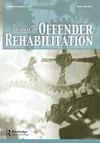Incremental beliefs and public attitudes toward restorative justice: the cases of sexual, violent and property offenses
IF 1.1
Q3 SOCIAL WORK
引用次数: 0
Abstract
Abstract Restorative justice (RJ) is oriented to respond to crime in ways that would repair individual, relational, and social harm. This study examined the relationship between type of offense and public attitudes toward RJ, in addition to the psychological mechanisms undergirding this relationship. We examined a model of three offense types (sexual, violent, and property) and their differential effect on support for RJ. Moreover, we examined whether this relationship was mediated by incremental beliefs, i.e., that human character is malleable. We also explored two control variables previously found predictive of attitudes toward punishment: perceived seriousness of the offense and fear of crime. Participants (N = 608) read a definition of one offense and completed a survey regarding incremental beliefs, fear of crime, perceived seriousness of the offense, and support for RJ. The findings indicated main effects of offense type on attitudes toward RJ. Additionally, differences between offense types were found in incremental beliefs and attitudes toward RJ, such that for both variables, sexual offenses were rated the lowest followed by violent and property offenses. An indirect effect of offense type on attitudes toward RJ through incremental beliefs was also found, but not through fear of crime or perceived seriousness.对恢复性司法的渐进信念和公众态度:性犯罪、暴力犯罪和财产犯罪案件
恢复性司法(RJ)是指以修复个人、关系和社会伤害的方式来应对犯罪。本研究考察了冒犯类型与公众对RJ的态度之间的关系,以及这种关系的心理机制。我们研究了三种犯罪类型(性犯罪、暴力犯罪和财产犯罪)的模型,以及它们对RJ支持的差异影响。此外,我们研究了这种关系是否由增量信念介导,即人类性格是可塑的。我们还探索了两个先前发现的预测惩罚态度的控制变量:对犯罪的严重性的感知和对犯罪的恐惧。参与者(N = 608)阅读了一项犯罪的定义,并完成了一项关于增量信念、对犯罪的恐惧、对犯罪严重性的感知和对RJ的支持的调查。研究结果表明,攻击类型对RJ态度有主要影响。此外,不同类型的犯罪在对性犯罪的增量信念和态度上也存在差异,在这两个变量中,性犯罪的评分最低,其次是暴力犯罪和财产犯罪。犯罪类型通过增量信念间接影响对犯罪的态度,但不通过对犯罪的恐惧或感知到的严重性。
本文章由计算机程序翻译,如有差异,请以英文原文为准。
求助全文
约1分钟内获得全文
求助全文
来源期刊

Journal of Offender Rehabilitation
SOCIAL WORK-
CiteScore
1.60
自引率
0.00%
发文量
24
期刊介绍:
The Journal of Offender Rehabilitation is a multidisciplinary journal of innovation in research, services and programs in criminal justice and corrections. The journal is an essential professional resource for practitioners, educators and researchers who work with individuals involved in the criminal justice system and study the dynamics of rehabilitation and individual and system change. Original research using qualitative or quantitative methodology, theoretical discussions, evaluations of program outcomes, and state of the science reviews will be considered.
 求助内容:
求助内容: 应助结果提醒方式:
应助结果提醒方式:


